Landmarks

The Gatherings

Aevo UTP
An imprint of University of Toronto Press
Toronto Buffalo London
utorontopress.com
Shirley N. Hager 2021
All rights reserved. No part of this publication may be reproduced, stored in or introduced into a retrieval system, or transmitted in any form or by any means (electronic, mechanical, photocopying, recording, or otherwise) without the prior written permission of both the copyright owner and the above publisher of this book.
Proceeds from the sale of this book will be used to foster understanding of Indigenous-settler relations and to support Indigenous-led initiatives striving for justice.
Library and Archives Canada Cataloguing in Publication
Title: The gatherings : reimagining Indigenous-settler relations / Shirley N. Hager ; with Gwen Bear [and 12 others] ; and afterword by Frances Hancock.
Names: Hager, Shirley N., 1952, author.
Description: Includes index.
Identifiers: Canadiana (print) 2020037737X | Canadiana (ebook) 20200377582 | ISBN 9781487508951 (hardcover) | ISBN 9781487539399 (EPUB) | ISBN 9781487539382 (PDF)
Subjects: LCSH: Indigenous peoples Maritime Provinces Social conditions. | LCSH: Indigenous peoples Maine Social conditions. | LCSH: Maritime Provinces Race relations. | LCSH: Maritime Provinces Ethnic relations. | LCSH: Maine Race relations. | LCSH: Maine Ethnic relations. | LCSH: Intercultural communication Maritime Provinces. | LCSH: Intercultural communication Maine.
Classification: LCC E78.M28 H34 2021 | DDC 305.897/0715 dc23
ISBN 978-1-4875-0895-1 (cloth) ISBN 978-1-4875-3939-9 (EPUB)
ISBN 978-1-4875-3938-2 (PDF)
Printed in Canada
We acknowledge the financial support of the Government of Canada, the Canada Council for the Arts, and the Ontario Arts Council, an agency of the Government of Ontario, for our publishing activities.

For Elly Haney, who made her visions her policy
In memory of
Gwen Bear
JoAnn Hughes
Betty Peterson
Wesley Rothermel
and
for all who dare to cross the deep, vast chasm of our fears of one another
Theres a word in Mikmaq: upisktwo. We might say in English forgiveness, but it means we return to that original place, and lets try again.
Miigamagan

Contents
Mawopiyane, in Passamaquoddy, literally means let us sit together, but the deeper meaning is of a group coming together, as in the longhouse, to struggle with a sensitive or divisive issue. The word indicates an urgency to meet because the outcome is something very desirable, such as resolving a conflict or bringing about peace. Its a healing word.
We, the Wabanaki members of the group that guided this project, chose this word to describe those of us who came together to create this book. Mawopiyane is a word that is recognizable in all Wabanaki languages, and it reflects the collaborative nature of our effort.
In those long-ago Gatherings, and again in co-creating this book, our commitment has been to aid one another in navigating through the hundreds of years of malfeasance, genocide of Indigenous peoples, and theft of homelands that has occurred in both the United States and Canada under the pretense of law. In the Gatherings, we re-enacted the form of treaty-making that existed among our peoples before the arrival of the European invasion. Our treaties between and among our Nations enabled the making of relatives and included all Living Beings. Indigenous Nations extended this form of treaty-making to the incoming Europeans and the establishment of their settlements, but ultimately those treaties were broken. Our Gatherings, described in this book, fulfilled the promise of our treaties, and they enacted the relations and the commitments that we are all collectively responsible to and for. Our commitment to one another in the Gatherings, and in creating this book, is a model for every Good Heart to follow and implement.
So much has happened since the start of this book project. Our small community has endured many challenges and losses, yet we persevered for each other. We are grateful for Shirleys dedication and patience, and for Francess expertise and guidance.
We hope that people will see our story as an example of what alliances look like. From the beginning, we gave voice to our differences and began building something. It was like constructing a house together. We are excited to share the lessons that we learned over time.
This book is our gift to our children, our families and friends, and the future.
Miigamagan
gkisedtanamoogk
Wayne A. Newell

This book has had many guardians. First and foremost, it was made possible through the collaborative leadership of a planning group of Native and non-Native individuals who have known one another for over thirty years. The group consisted of Miigamagan (who is Mikmaq), gkisedtanamoogk (Wampanoag), Wayne Newell (Passamaquoddy), Frances Hancock (a New Zealander of Irish descent), and myself (a White North American). I am deeply grateful to Miigamagan, gkisedtanamoogk, and Wayne for giving themselves wholeheartedly to this project. In addition to their sustaining friendship, they invested their concerns, commitment, hopes, and aspirations in this book. I consulted them regularly and they generously shared their perceptions and opinions, as well as their descriptions and explanations of Wabanaki cultures. They embraced my questions with patience and honesty. Their insights, critical analysis, and belief in building alliances between our peoples are woven into the text. Without their wisdom and moral support this project could not have happened.
At every stage, this book was nurtured by the care, devotion, expertise, and wisdom of our New Zealand friend Frances Hancock. Originally intended to be our researcher and writer, Frances was derailed by a series of eye surgeries that rendered her unable to travel and, as a result, she encouraged me to step into these roles. By phone and e-mail from New Zealand, she persevered in her commitment by offering ongoing support as advisor. She drafted grant proposals, suggested questions and topics to pose at our planning meetings and in the personal interviews, and was an unfailing cheerleader on our monthly calls. Once able to travel, she returned to Maine in 2015 and accompanied me on visits with the books contributors, taking meticulous notes on their suggested revisions to the manuscript. She was also the books initial editor, giving feedback on both first and second drafts. It is fitting that she writes our afterword, drawing on her experiences working with and for the Mori, the Indigenous people of New Zealand, and reflecting on the universal elements of building alliances.
Four contributors to this book, Gwen Bear, JoAnn Hughes, Betty Peterson, and Wesley Rothermel, have since passed on, but thankfully not before they shared their experience with us. They are greatly missed and very much alive in the pages that follow.

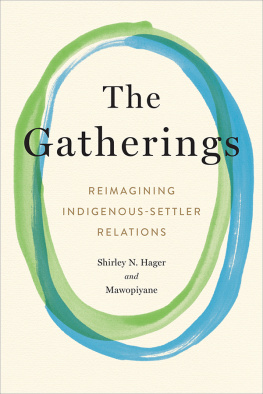

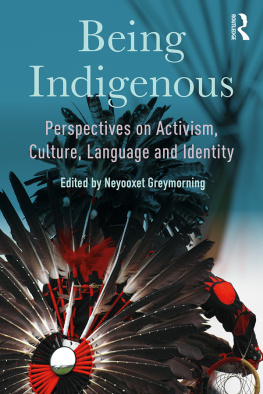

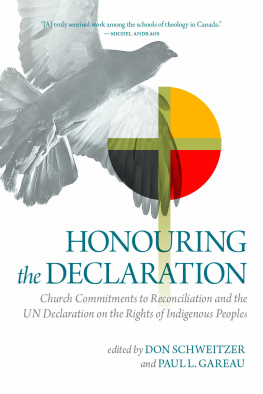
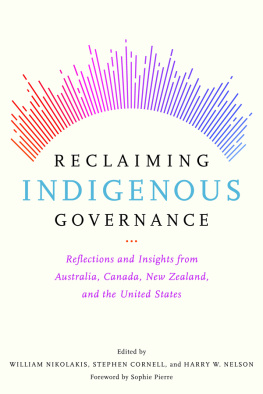
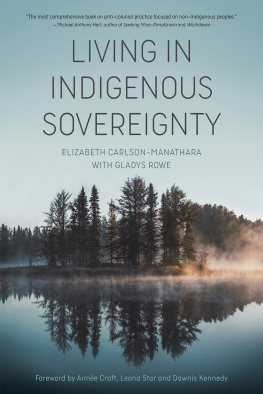
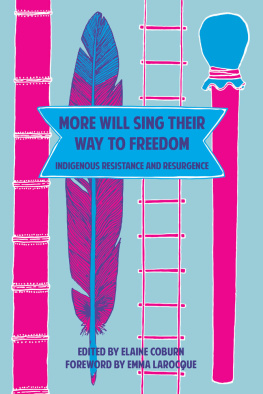
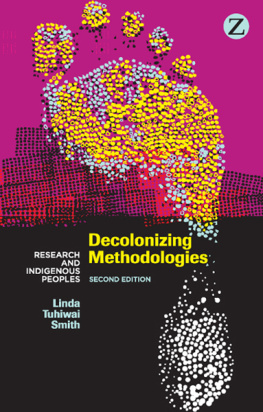
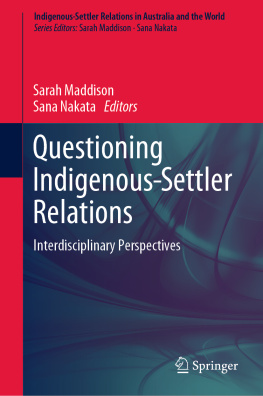



 Contents
Contents